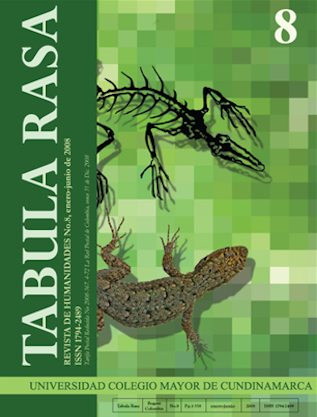Mostrar biografia dos autores
El objetivo global de estas notas exploratorias es abrir el debate sobre ciertos aspectos importantes de las intersecciones entre poder, conocimiento y geopolítica, y hacerlo en el contexto del resurgimiento de visiones imperiales y de la necesidad urgente de una descolonización de la imaginación. El terreno analítico es extenso y las vías de pensamiento esbozadas aquí representan un intento de contribuir a una serie actual de estudios y proyectos de investigación que retan viejas y nuevas formas de perspectiva colonial e imperial. Partiendo de una primera y breve reflexión sobre poder, conocimiento y geopolítica, el estudio valora la importancia de lo crítico en el conocimiento crítico para a continuación refutar el predominio del pensamiento euroamericano, para llegar a una consideración final acerca de la importancia del poder colonial e imperial.
Visualizações de artigos 117 | Visitas em PDF 94
Downloads
Achcar, G. 2004. “U.S.Imperial Strategy in the Middle East”. Monthly Review, 55(9):23-36.
Agnew, J., Mitchell, K., y Toal, G. (eds.). 2003. A Companion to Political Geography. Oxford: Blackwell.
Bauman, Z. 1999. In Search of Politics. Cambridge: Polity Press.
Bauman, Z. 2002. Society under Siege. Cambridge: Polity Press.
Bourdieu, P., y Wacquant, L. 1999. “On the Cunning of Imperialist Reason”. Theory, Culture and Society, 16 (1):41-58.
Carothers, T. 1991. In the Name of Democracy. Berkeley: University of California Press.
Carver, T. 1998. The Postmodern Marx. University Park: Pennsilvania State University Press.
Castro-Gómez, S. 2000. “Traditional and Critical Theories of Culture”. Nepantla. Views from South, 1 (3):503-518.
Ceceña, A. E. 2004. «El Zapatismo – de la inclusión en la nación al mundo en el que quepan todos los mundos», en J. M. Gómez (ed.), América Latina y el (Des)Orden Global Neoliberal. 301-320. Buenos Aires: CLACSO.
Césaire, A. 2000. Discourse on Colonialism. New York: Monthly Review Press.
Dagnino, E. 1998. “Culture, Citizenship and Democracy: Changing Discourses and Practices of the Latin American Left”, en S. Alvarez, E. Dagnino y A. Escobar (eds.), Cultures of Politics, Politics of Cultures. 33-63. Boulder y Oxford: Westview.
Dhaliwal, A. 1996. “Can the Subaltern Vote? Radical Democracy, Discourses of Representation and Rights and the Question of Race”, en D. Trend (ed.) Radical Democracy. 42-61. Londres y Nueva York: Routledge.
Doty, R. .1996. Imperial Encounters. Minneapolis: University of Minnesota.
Dubois, L. 2000. “La République Métisée: Citizenship, Colonialism and the Borders of French History”. Cultural Studies, 14 (1):15-34.
Dussel, E. 1996. Filosofía de la Liberación. Bogotá: Editorial Nueva América
Dussel, E. 2002. “World System and ‘Trans’-Modernity”. Nepantla. Views from South, 3 (2):221-244.
Escobar, A. 1995. Encountering Development. Princeton (New Jersey): Princeton University Press.
EZLN. 2005. Sixth Declaration of the Selva Lacandona. Obtenido el 2 de noviembre de 2005, en http://www.ezln.org/documentos/2005/sexta1.en.htm.
Falk, R. 1995. On Humane Governance. Cambridge: Polity Press.
Foucault, M. 1979. Discipline and Punish. Harmondsworth: Peregrine Books.
Foucault, M. 1980. Power/Knowledge. C. Gordon (ed.). Nueva York: Pantheon Books.
Freire, P. 2004. Pedagogy of Indignation. Boulder y Londres: Paradigm Publishers.
González Casanova, P. 1995. Causes of the Rebellion in Chiapas. México: UNAM.
Gregory, D. 2004. The Colonial Present. Oxford: Blackwell.
Grosfoguel, R. Maldonado-Torres, N., y Saldívar, J. D. 2005- “Latin@s and the ‘EuroAmerican Menace’”, en R. Grosfoguel, N. Maldonado-Torres y J. D. Saldívar (eds.), Latin@ sin the World-System. 3-27. Boulder y Londres: Paradigm Publishers.
Harvey, D. 2003. The New Imperialism. Oxford: Oxford University Press.
Harvey, N. 1998. The Chiapas Rebellion. Durham y Londres: Duke University Press.




